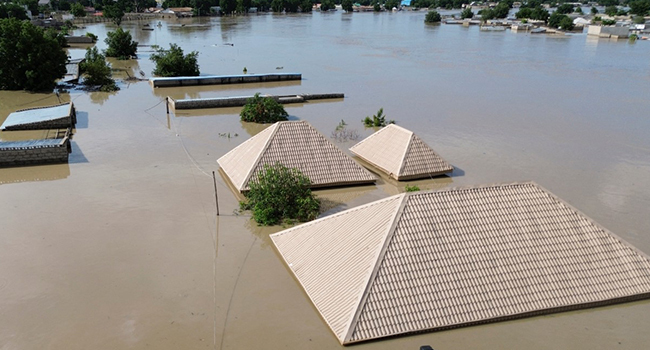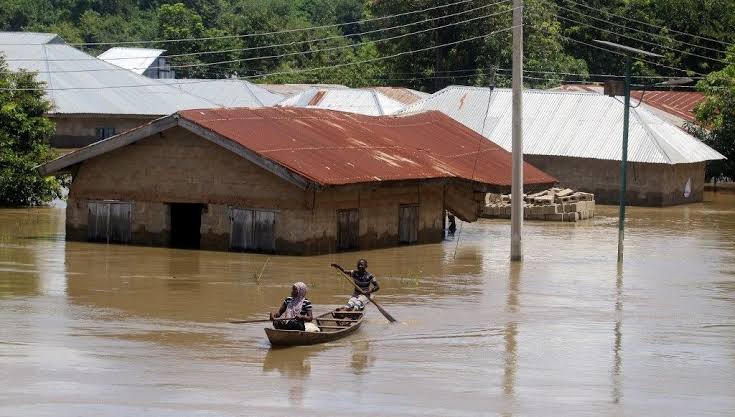Africa
Rising From The Ruins: How Flood Victim’s In Maiduguri Are Rebuilding Their Lives, by Bintu Umaru Ibrahim

In the heart of northeastern Nigeria, Maiduguri, the capital of Borno State, has long been a city marked by adversity. From the ravages of insurgency to the recent devastating floods, the resilience of its people is continually tested. The floods that struck in late 2022 left thousands homeless, their livelihoods washed away in a matter of hours. Yet, amid the destruction, stories of hope and determination are emerging as the community begins to rebuild. The floods, which were exacerbated by heavy rainfall and poor drainage systems, submerged entire neighborhoods, displacing families and destroying homes. According to local authorities, over 50,000 residents were affected, with many losing everything they owned. The immediate aftermath saw a surge in humanitarian efforts, with NGOs and government agencies rushing to provide food, shelter, and medical assistance to those in need. As the waters receded, the true extent of the damage became apparent. Streets that were once bustling with life were now lined with debris, and the stench of decay hung in the air. Yet, amidst the chaos, the spirit of the people remained unbroken. Community leaders and volunteers quickly organized relief efforts, distributing food and essential supplies to the most vulnerable.

One such leader, Fatima Abubakar, a local teacher, took it upon herself to coordinate relief efforts in her neighborhood. “We lost everything, but we still have each other,” she said, her voice steady despite the tears in her eyes. Fatima rallied her neighbors, and together they formed a support group to help those who had lost their homes. “We are rebuilding not just our houses, but our lives,” she added, embodying the resilience that defines the people of Maiduguri. As the community began to stabilize, the focus shifted from immediate relief to long-term recovery. Local government officials, in collaboration with NGOs, initiated programs aimed at rebuilding homes and restoring livelihoods. Microfinance initiatives were launched to provide small loans to families looking to start businesses or rebuild their homes. This financial support has been crucial in helping families regain their independence. One of the most inspiring stories comes from a group of women who banded together to form a cooperative. With the help of a local NGO, they received training in tailoring and crafts, allowing them to create and sell their products. “We lost everything, but we found strength in each other,” said Aisha Mohammed, one of the cooperative members.
Their determination not only provides them with an income but also fosters a sense of community and solidarity. However, the road to recovery is fraught with challenges. Many families still live in temporary shelters, and access to clean water and sanitation remains a pressing issue. Health concerns are on the rise, with reports of waterborne diseases surfacing in the aftermath of the floods. Community health workers are working diligently to provide medical care and raise awareness about hygiene practices to prevent outbreaks. Despite these challenges, the people of Maiduguri are determined to rise from the ruins. Community gatherings have become a source of strength, where residents share their stories, support one another, and celebrate small victories. “Every day is a step forward,” said community leader Ibrahim Saleh. “We are not just surviving; we are thriving.”

The resilience of Maiduguri’s residents has not gone unnoticed. National and international media have begun to highlight their stories, drawing attention to the need for continued support and investment in the region. Fundraising campaigns and awareness initiatives are gaining momentum, with many people eager to contribute to the recovery efforts. As the city slowly rebuilds, the scars of the floods remain visible. Yet, the spirit of the people shines through, a testament to their strength and determination. The stories of survival and resilience are not just about loss; they are about hope, community, and the unwavering belief that a better future is possible. The journey of rebuilding is not just about physical structures; it is about healing and restoring dignity.
The people of Maiduguri are not merely victims; they are survivors, warriors in their own right, fighting to reclaim their lives and their city. Their stories serve as a powerful reminder of the human spirit’s capacity to endure and thrive, even in the face of overwhelming adversity. As Maiduguri rises from the ruins, it does so with a renewed sense of purpose. The community is not just rebuilding homes; they are forging a new identity, one rooted in resilience, solidarity, and hope. The future may be uncertain, but the people of Maiduguri are ready to face it together, united in their quest for a better tomorrow.
BINTU UMARU IBRAHIM
DEPARTMENT OF MASS COMMUNICATION
BORNO STATE UNIVERSITY
300 LEVEL



























